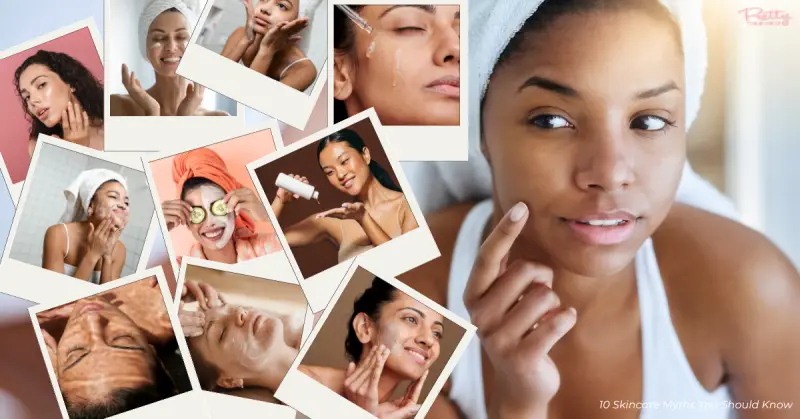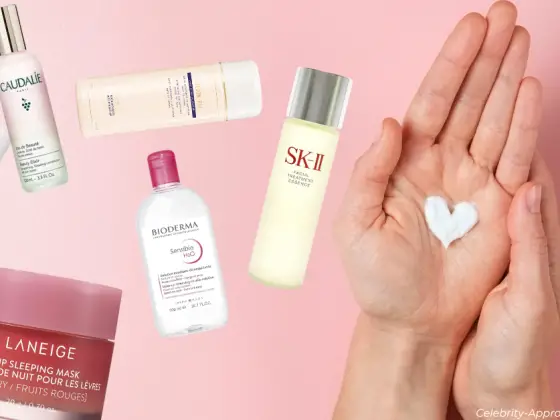
Skincare advice can feel overwhelming, especially with influencers promoting countless products and age-old remedies adding to the mix. The challenge? Not all advice is fact-based. Many skincare beliefs are rooted in myths passed down through generations or amplified by the internet. These misconceptions can often lead to choices that harm rather than help your skin.
In this article, we’re peeling back the layers to reveal the truth behind common skincare myths. Understanding the facts is critical whether you’re devoted to a 10-step routine or just beginning. Let’s debunk these skincare myths and guide you toward healthier, glowing skin.
10 Skincare Myths You Should Know
Skincare Myth #1: Cleansing Twice a Day is a Must
We’ve all been told that cleansing in the morning and at night is the golden rule of skincare. But here’s the truth: cleansing twice daily isn’t a one-size-fits-all solution. If you have oily skin or frequently wear makeup, washing your face twice can help eliminate excess oil, dirt, and any buildup from products. However, this routine can backfire for people with dry or sensitive skin. Cleansing your skin too frequently can remove its natural oils, resulting in dryness and irritation and weakening your skin’s protective barrier.
If your skin feels tight or overly dry after cleansing, stick to washing your face once a day, preferably at night, to remove dirt and pollutants. In the morning, a gentle splash of water or a hydrating toner might be all your skin needs. The most important thing is to find a routine that makes your skin feel clean without feeling stripped.
Skincare Myths #2: Oily Skin Doesn’t Need Moisturizer
One of the most persistent myths is that people with oily skin should skip moisturizer to avoid looking shiny. It couldn’t be further from the truth. Not moisturizing can make oily skin worse. When your skin is deprived of moisture, it compensates by producing even more oil, creating a vicious cycle.
The key is finding the correct type of moisturizer. Choose oil-free, non-comedogenic formulas that hydrate without blocking pores. Gel-based moisturizers are often a good option, providing lightweight hydration while keeping excess oil at bay. Healthy skin is always hydrated, no matter your skin type.
Skincare Myths #3: Exfoliate Every Day for Smooth Skin
Exfoliation can make your skin feel incredibly smooth and soft, so some people get hooked on daily exfoliation. However, exfoliating too often can cause micro-tears in the skin, irritation, and sensitivity. It can also intervene with your skin’s natural barrier, which can cause further skin problems. It makes it more vulnerable to environmental damage and breakouts.
Exfoliating 2-3 times a week is generally best for most skin types. If you’re using chemical exfoliants like AHAs or BHAs, start slow and work your way up to see how your skin reacts. On the other hand, physical scrubs should be used cautiously, especially if they contain harsh particles like crushed walnut shells or sugar, which can be too abrasive for the skin.
Skincare Myths #4: Natural Ingredients are Always Better
The term “natural” has become a buzzword in the beauty industry, but it’s important to remember that not all natural ingredients suit your skin. Some natural ingredients can be too harsh, irritating, or unsafe when applied to the skin. For instance, lemon juice is commonly promoted as a brightening ingredient. However, its high acidity can lead to irritation and increase your skin’s sensitivity to sunlight.
On the flip side, synthetic ingredients, like retinoids or peptides, have been thoroughly researched and can offer targeted solutions for specific skin concerns. It’s less about whether an ingredient is natural or synthetic and more about how it works with your skin. As a dermatologist might tell you, the efficacy of an ingredient and how your skin responds to it should be the deciding factors.
Skincare Myths #5: Aging is an Inevitable Process
Aging is a part of life, but your skincare routine can significantly influence your skin age. While we can’t completely halt the aging process, we can slow it down with the right approach. One of the biggest myths is that it’s too late to start anti-aging products once you notice wrinkles or fine lines. The truth is, it’s never too late to benefit from skincare. Ingredients like retinoids, vitamin C, and peptides have been proven to stimulate collagen production, smooth fine lines, and improve skin texture. And let’s not forget about sunscreen—it’s your best friend in preventing premature aging caused by sun damage.
Beginning a preventive skincare routine in your 20s or 30s will set you up for long-term success. And if you’re in your 40s, 50s, or beyond, it’s not too late to benefit from products that can enhance your skin’s appearance and health.
Skincare Myths #6: Sun Exposure is Good for Vitamin D
We’ve all heard that the sun is a natural vitamin D source. While true, you don’t need to risk skin damage to get it. Most people can obtain sufficient vitamin D from a couple of minutes of sun exposure, even if they wear sunscreen. Prolonged unprotected sun exposure increases your risk for skin cancer, sunburn, and premature aging.
If you’re concerned about vitamin D levels, relying on dietary sources or supplements is safer than sacrificing your skin’s health. Dermatologists note wearing sunscreen daily to guard against harmful UV rays, even when it’s cloudy.
Skincare Myths #7: Expensive Skincare Products are Superior
Luxury skincare brands often have hefty price tags but be aware of thinking that higher cost means higher quality. Drugstore products frequently contain the same active ingredients as their more expensive counterparts and can be just as effective. What you’re paying for with high-end products is usually the packaging, marketing, and brand name.
Dermatologists frequently recommend affordable brands because they focus on science-backed formulas that deliver accurate results. It’s always a good idea to check the ingredients list and consult a skincare expert to determine what will work best for your skin rather than focusing on price alone.
Skincare Myths #8: Sleeping in Makeup is Okay
We’ve all been there—a long day or late night makes it tempting to skip your nighttime skincare routine and crash. But sleeping in makeup can have severe consequences for your skin. Makeup can clog pores, trapping oil and bacteria, leading to breakouts and dull skin. Over time, this habit can speed up aging by breaking down collagen and forming fine lines and wrinkles.
A simple cleanse before bed only takes a few minutes and can make a difference in keeping your skin healthy and glowing. If you’re in a pinch, makeup wipes or micellar water can help remove makeup quickly, though they’re not a substitute for a thorough cleanse.
Skincare Myths #9: Stress Doesn’t Affect Skin
Stress affects your skin directly by increasing the release of cortisol. It is a common hormone that can cause inflammation, acne, and other skin problems. Chronic stress can exacerbate conditions like eczema, psoriasis, and rosacea, making it harder for your skin to heal and repair itself.
Taking time to manage stress through mindfulness, exercise, or hobbies you enjoy can positively affect your mental health and your skin. When you’re relaxed, your skin reflects that balance, often appearing brighter and more radiant.
Skincare Myths #10: Acne is a Teenage Problem Only
Many people think acne disappears after the teenage years, but adult acne is more common than you might realize. Hormonal fluctuations, stress, diet, and even some skincare products can contribute to acne well into adulthood. Unlike teenage acne, which is often concentrated in the T-zone, adult acne tends to appear around the jawline and cheeks.
Treating adult acne requires a different approach, often involving a combination of gentle cleansers, topical treatments like retinoids, and lifestyle changes. Dermatologists can also help tailor treatments to suit both acne and anti-aging concerns.
Is Skincare Good or Bad for Your Skin?
Skincare, when done correctly, is incredibly beneficial for your skin’s health and appearance. Starting healthy skincare habits early on—like moisturizing, using sunscreen, and incorporating antioxidants—can help strengthen your skin and protect it from environmental damage. As you grow older, these habits can help postpone the signs of aging and maintain a youthful appearance for your skin.
However, overdoing it with skincare can have its downsides. Overusing products with harsh ingredients can cause irritation, redness, or even damage your skin barrier. Striking a balance and focusing on your skin needs is critical to maintaining long-term health.
Cons to Consider When Using Skincare Products
While the benefits of skincare are well-documented, there are some potential downsides. Skincare routines can become time-consuming, especially if you’re following a multi-step routine. It can make it challenging to maintain consistency, especially if you have a busy lifestyle.
The cost of skincare products can also add up quickly. While high-quality products usually have a higher price tag, it’s important to note that, as we’ve discussed, there are affordable alternatives that can also be effective. It’s essential to only constantly buy new products after giving them time to work.
Moreover, the skincare industry is loosely regulated, meaning some products may contain harmful ingredients or allergens. Always check labels and consult a dermatologist if unsure about a product’s safety or efficacy.
Skincare myths can mislead but understanding what truly benefits your skin is vital. Since everyone’s skin is unique, what works for one may not work for you. By debunking these myths, you’ll make better choices and achieve healthier, more radiant skin.
Skincare doesn’t have to be complicated. Stick to the basics, trust the science, and listen to your skin. Focus on what works best for you, and prioritize consistency over trends. Remember, skin care is about nurturing your skin and protecting your body’s largest organ for long-term health and radiance.
















